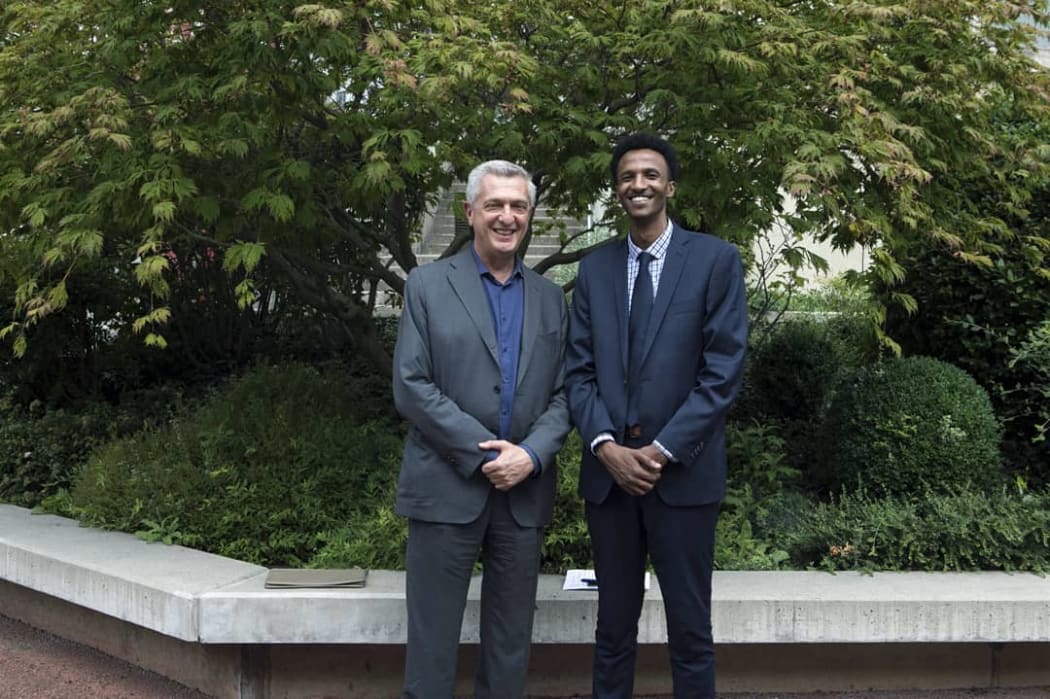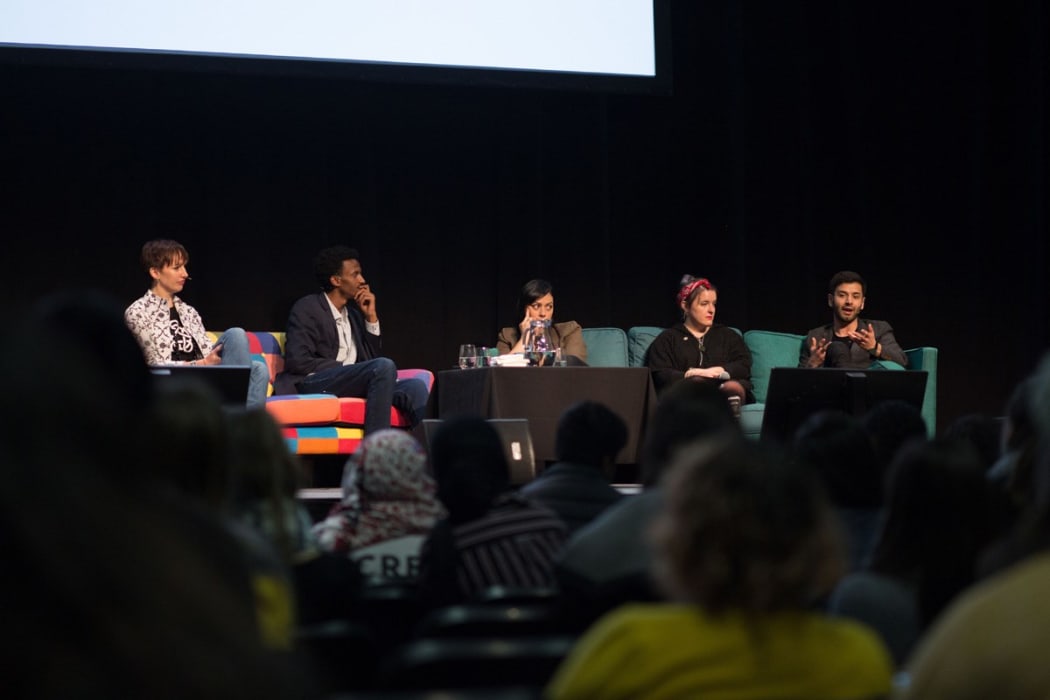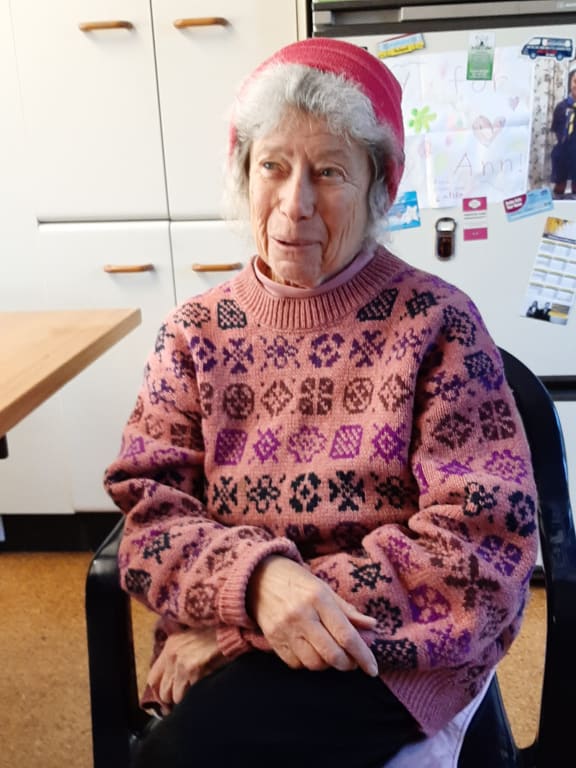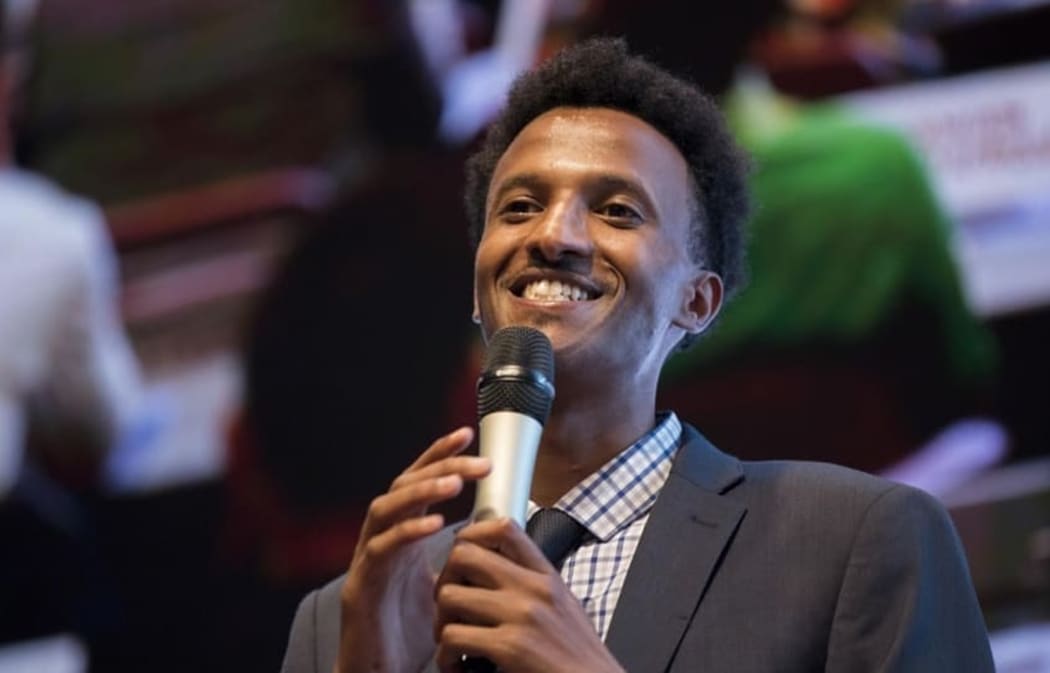Guled Mire is a man who has overcome major obstacles to claim a spot on the world stage. He came here as a refugee, struggled at school, was bullied and ended up dropping out.
Now he is a university graduate, a policy maker and a spokesman for his community.
And Guled Mire wants other kids like him to get the chance to succeed, but knows that would mean changing a racist immigration policy.
Currently New Zealand's policy stops refugees from Africa and the Middle East from resettling in Aotearoa unless they already have family living here.
“To treat one group differently from another is racist,” he said. “It’s just racist. I know it’s a taboo word for some but that is what it is. Why are we treating people different to others?”

Guled Mire and UN High Commissioner for Refugees, Filippo Grandi Photo: UNHCR/Susan Hopper
Subscribe to Voices for free on Apple Podcasts, Spotify, Stitcher and Radio Public or wherever you listen to your podcasts.
For Guled, this is personal and given his own background and experience he won't rest until the policy is changed.
“I think about all the little Guled’s in refugee camps across the world,” he said. “If this was in the 1990s me and my family would not have made it here. So that is why I’m on a mission to see this eradicated asap.”
Guled came to Aotearoa as a 6-year-old. He had left Somalia with his mother and siblings, fleeing the civil war, that sadly claimed the life of his dad.
He was born in 1991 about the time the government was crushed, and opposition forces took over, giving the people hope.
His family were connected to opposition movements in Somalia and so he was named Guled, which means ‘successful’.
“The rebellion at that time was successful in that sense, but the development since has been tragic as there’s been a civil war for like over 20 years now.”
Guled and his family settled in Hamilton, but it wasn’t easy. Going to school in the 1990s was not a good experience.
“For me, I was bullied because of my difference in the New Zealand education system. Going through things like everyday racism or own refugee background and that in itself has been really difficult.”
Guled left school when he was 16-years-old.

Guled Mire speaking at Festival for the Future panel Photo: Inspiring Stories
“My teachers told me that university wasn’t a place for people like me and that I should consider the trades but that made no sense to me because I wasn’t even good with my hands.”
He believed those types of messages affected his personal confidence in his abilities and impacted his self-esteem.
Guled set out to prove his teachers wrong and ended up studying in Auckland. He was able to attend university under a special admission category where he completed his undergraduate degree in criminology and international studies.
He went on to do his postgraduate in policy studies and pursued a career in public policy. Currently he resides and works in Wellington.
The 28-year-old credits his determination to his mother’s influence, given her sacrifices and tenacity. He says his mother is incredible to have raised nine children here after relocating.
“I’m really lucky to have a strong wahine mother single parent who instilled a sense of culture and identity in me at such a young age.”
“We are from a strong Muslim background and so our religion teaches us to show love and kindness to one another.”
Guled is hoping for positive changes this year.
“I want to help shape society and that sort of society that I want for my future kids to grow up in. The world where my nieces will grow up in and decide whether or not to wear the hijab or not,” he said.
“It’s a really cruel world that we are growing up in and I think it requires a whole society type approach.”

Ann Beaglehole Photo: RNZ / Sara Vui-Talitu
Echoing Guled's thoughts is Wellington based historian and author Ann Beaglehole. Her specialty areas of research are immigration and refugees.
“I came as a refugee myself, so it is a subject I have been researching all my life,” she said.
As an 8-year-old child, Ann fled 1950s communism in Hungary to come to Aotearoa.
“Compared to some of the refugees coming here now, we had a relatively easy time. You only waited a couple of months in a refugee camp before coming to New Zealand.”
“We also had white skin and were fleeing communism and soviet domination. We were well regarded then.”
Ann also thinks the African and Middle east refugee policy is exclusive and needs to go.
“Yes, it seems obviously racist and discriminatory but the complication is if you think about it is how they are selling it as a family reunification process,” she said.
“But the thing is new refugees just can’t come if there are no family links.”
The refugee quota was raised to 1500 this year and Immigration Minister, Iain Lees-Galloway has continued to say that the policy settings are being scrutinized as part of a three-yearly review of refugee policy. An announcement will be made within months.
Guled has recently returned from Geneva where he talked about New Zealand's policy on African and Middle East refugees at the UNHCR, the UN Refugee Agency. He said it was an incredible opportunity to talk frankly about what is happening in New Zealand on the world stage.
“People were shocked, as that is not the image that we like to play off,” he said and his intention is to help New Zealand do better.

Guled Mire speaking at UNHCR NGO consultations Photo: UNHCR/Susan Hopper

